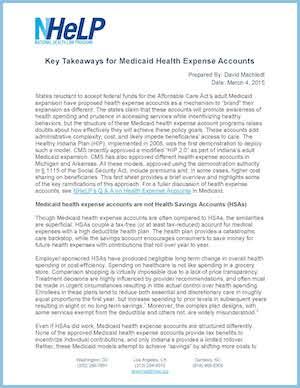By: David Machledt


Executive Summary
States reluctant to accept federal funds for the Affordable Care Act’s adult Medicaid expansion have proposed health expense accounts as a mechanism to “brand” their expansion as different. These accounts add administrative complexity, cost, and likely impede beneficiaries’ access to care. The Healthy Indiana Plan (HIP), implemented in 2008 and renewed with changes in 2015, was the first demonstration to deploy such a model. CMS has also approved different health expense accounts in Michigan and Arkansas. All these models, approved using the demonstration authority in § 1115 of the Social Security Act, include premiums and, in some cases, higher cost sharing on beneficiaries. This fact sheet provides a brief overview and highlights some of the key ramifications of this approach to Medicaid expansion. For a fuller discussion of health expense accounts, see NHeLP’s Q & A on Health Expense Accounts in Medicaid.